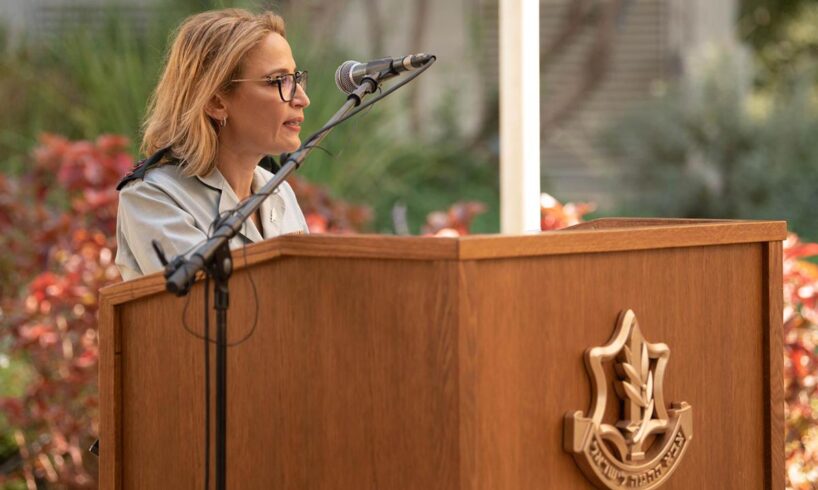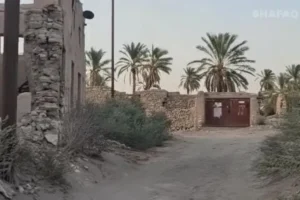
Editor’s note: This story contains descriptions of graphic violence.
The IDF’s Military Advocate General, Maj. Gen. Yifat Tomer-Yerushalmi, was arrested on Sunday, after admitting last week to her involvement in leaking a video from a controversial Israeli detention center.
The Military Advocate General is the top internal investigator within the IDF, responsible for investigating misconduct, advising on rules of engagement, and ensuring that the army operates in accordance with Israeli and international law. In essence, the office functions as the military’s internal watchdog, maintaining accountability and ethical standards within the ranks.
Tomer-Yerushalmi’s arrest is just the latest chapter in a months-long controversy surrounding Sde Teiman, a detention center in southern Israel where many Gazans were held during the war. Reports and leaked footage from the site have sparked intense public debate over the treatment of detainees and the military’s oversight of the facility.
The Sde Teiman controversy
Allegations of abuse at Sde Teiman emerged starting around Spring 2024.
In May 2024, CNN reported — citing what it said were Israeli whistleblowers — that some prisoners had to have their limbs amputated because of constant handcuffing, and that neglected wounds were left to rot. The whistleblowers said that the prisoners were beaten “out of revenge.”
They also alleged that forces at the facility would routinely unleash large dogs on sleeping detainees, throwing a sound grenade into holding cells as they entered. One medical worker who spoke with CNN said he was ordered to perform procedures for which he wasn’t qualified.
The IDF said at the time that it “rejects outright allegations concerning systematic abuse of detainees.” It added that no concrete complaints had been filed from detainees or lawyers, but claimed that it was examining the cases reported by media outlets regardless.
Then in July, the situation erupted. A reservist at the base was arrested on suspicion of beating bound prisoners and filming the act. (In February of this year, he was convicted and sentenced to seven months in jail.)
As Military Police looked into that case, they started hearing about more accusations.
The soldiers questioned in the case told investigators that beatings like those videoed were the “accepted behavior” at Sde Teiman, claiming that commanders at the facility were aware of the situation, according to KAN, Israel’s national broadcaster: “They know that [the soldiers] use aggression, and they know they use batons. What you saw in the video (of the beatings in the case that led to seven months in jail), they know that this is the ‘atmosphere’ in the facility.”
One of the soldiers was questioned about whether he believes this is a “legitimate ‘punishment’” to give to prisoners. The soldier responded, “No, but this was the point of the punishment. The point was in terms of deterrence and ensuring he doesn’t get up and go crazy.”
As these investigations continued, Telegram groups and influencers began a campaign to collect the names and photos of Military Police involved in investigating the abuse allegations to pressure them to drop any inquiry and to threaten them, including with violence.
Later in July 2024 came the case that’s now at the center of controversy. A Gazan prisoner, suspected of being a police officer affiliated with Hamas, was brought to the facility and underwent a standard procedure search. However, shortly after, he was found bleeding profusely from his rectum. He was rushed to a clinic and then a hospital for emergency surgery.
Doctors who examined the prisoner found signs of unusual injuries, including broken ribs and severe internal injuries in his lungs and intestines. They determined that these were injuries that could have only been caused by violence. One doctor later told Israeli media that he initially thought that a fight between prisoners had caused it, and hadn’t even considered that anyone else could have been involved. Due to the unusual injuries, the incident was reported to the commander of Sde Teiman, and an investigation was opened.
Military investigators looked into several possibilities that could have caused the prisoner to start bleeding from his rectum, but all of these options were ruled out, except for one: the injury was caused by the guards at the facility.
In light of these findings and surveillance camera footage that would later become the central point of controversy in this case, Military Police decided to detain the soldiers who handled the prisoner.
In late July, Military Police arrived at Sde Teiman to detain the soldiers. Most agreed to go in for questioning without any issue, but a few asked to pick up items from their rooms first.
As they neared their rooms, they started shouting, “The police are here, the police are here!” At that point, chaos broke out. Other soldiers at the scene started clashing with the Military Police, blocking them from leaving the base, attempting to free the detained soldiers, and even threatening the investigators with violence.
Amid the chaos, a few soldiers published videos on social media calling on the public to come to the facility to help stop the arrests. Large crowds, led by several far-right members of Knesset and ministers, arrived and forced their way into the base. Later, further clashes erupted at the Beit Lid base, where the detained soldiers were being held, with protesters forcing their way into that base too.
Many of the soldiers and protesters involved in the violence later said that the main thing they took issue with was how the arrests were carried out. The investigators arrived at the scene with masks covering their faces, which some felt humiliated the soldiers, as this is commonly how terrorists are arrested. The investigators said later that they wore masks to protect themselves because of the doxxing and threats that targeted their colleagues in past cases.
The uproar continued to build in the following days. Further threats were issued, and increasing pressure was placed on Military Police, both by influencers and members of the government.
The leaked video: What does and doesn’t it show?
Then came the moment that’s now at the center of controversy: A clip, described as from the surveillance cameras in Sde Teiman, was leaked to the press. The clip showed a few seconds of the search the prisoner underwent, as well as a wider shot of a holding cell believed to be right before the incident.
Doubts were raised about the authenticity of the clip, and then, in May of this year, KAN confirmed that the clip didn’t show the whole story. The second, wider shot in the clip was found to have been taken on a different day. The first clip, while it was from the actual incident, was only a small part of a much longer video.
KAN published the full 18-minute video, showing the incident from two angles. However, the full video only raised more questions.
In the video, seven soldiers can be seen taking the prisoner to the side of the holding cell. The prisoner was handcuffed, blindfolded, and had his legs bound. Three of the soldiers surrounded the prisoner with riot shields, while three others searched him, and another with a dog stood off to the side.
Soldiers from Force 100 told KAN that this was the standard procedure for these kinds of searches. Shortly before this prisoner was searched, three other prisoners were searched as well. Their searches typically took no more than five minutes, whereas this fourth search took 18 minutes. The soldiers said this was because he started resisting and tried to take one of their tasers.
Within a minute after the search began, the prisoner is seen on his knees in the video. There’s no sound in the video, but the dog is seen reacting to something. What that is isn’t clear from the footage.
Two minutes in, the prisoner appears to be back on his feet, and one of the soldiers is seen making what looks like a back-and-forth motion with his hand while holding a narrow object. This motion remained unexplained during questioning, according to KAN.
Shortly afterwards, the prisoner is back on the ground. This is the point at which the soldiers claim he started resisting the search. The soldier holding the dog is seen switching places with one of the soldiers conducting the search. He then does something that isn’t clearly visible in the video, and immediately after, the prisoner starts moving around wildly for a few seconds. Shortly after that, the prisoner stops moving, lying on the ground completely still, and this is how he stays for most of the rest of the video. Every few minutes afterwards, a different soldier kicks the prisoner and stands on top of him. Later in the video, the prisoner can be seen propped up on the wall with the lower part of his body partially uncovered. At several points in the video, the soldiers can be seen messing around with the prisoners’ pants, although that could have been just standard for the search.
A few minutes later, the prisoner is seen being dragged back to the central part of the cell. According to KAN, not long after this point, blood started staining his pants, at which point he was transferred to a clinic in the facility. Video from the clinic, which was shown to KAN but not to the public, shows the prisoner lying on a table with his pants full of blood. In a WhatsApp message from the facility, one soldier noted that night that the prisoner in question was bleeding from his rectum and that it was getting worse.
In February, an indictment was filed against five soldiers on charges of severe injury and assault under aggravated circumstances. Originally, the five were expected to be charged with sexual assault, but this charge wasn’t added to the final indictment.
Over time, attention on the case waned until it exploded again this past week.
The new controversy and the arrest of the Military Advocate General
Last week, police announced they had opened an investigation into the leak of the original clip of the incident to N12. A few days later, Military Advocate General Yifat Tomer-Yerushalmi resigned, saying she had approved the leak to the press.
On Sunday, the case took a dramatic turn after Tomer-Yerushalmi went missing. Her car was discovered abandoned on a beach in the Tel Aviv area, raising concerns that she had attempted suicide. Late in the evening, she was found safe and sound. However, shortly afterwards, it was uncovered that while she went missing, she had thrown away her phone.
In light of the incident, Tomer-Yerushalmi was arrested on suspicion of attempting to disrupt the investigation. Other officials in her office have also been detained and questioned, including the former chief military prosecutor.
The Military Advocate General is also suspected of lying to the Supreme Court, as the judiciary was previously informed that an internal investigation by her office had found no reason to launch a criminal investigation and no way to determine who leaked the video. This statement was made by officials in her office, who allegedly knew that the Military Advocate General was responsible for the leak.
While Tomer-Yerushalmi worked in the military judicial system, which is separate from the civil judicial system, government officials and activists who have been clashing with the civil judicial system in recent years insisted that the leak and the investigation proved their points concerning the civil judicial system.
On Sunday, Prime Minister Benjamin Netanyahu called the leak of the video from Sde Teiman “perhaps the most severe public relations attack the State of Israel has experienced since its establishment.” He stressed that the video “caused immense damage to the image of the State of Israel and to our soldiers.” Other Israelis argued that separate issues, such as controversial statements made by Israeli politicians and activists, received more attention internationally, including in international courts.
NETANYA, ISRAEL – JULY 30: Far-right Israelis and relatives of the soldiers gather in front of the military court building and stage a protest against the arrest of nine soldiers accused of sexually abusing a Palestinian detainee at Sde Teiman Prison in the Negev desert, in Netanya, Israel on July 30, 2024. (Photo by Mostafa Alkharouf/Anadolu via Getty Images)
Justice Minister Yariv Levin announced on Saturday night that he would not allow Attorney-General Gali Baharav-Miara to be involved in the investigation into Tomer-Yerushalmi. The government and the attorney general have repeatedly clashed over the past few years. The legal adviser for the Justice Ministry agreed that Baharav-Miara was subject to a conflict of interest on the issue, preventing her from being involved in the investigation.
The legal adviser stressed that “this cautious position in no way casts any blame or takes a position regarding the involvement of the attorney general in the case, but rather its entire purpose is to ensure the independence of the investigative process, including the appearance of the process.”
On Thursday, Levin appointed retired judge Asher Kula to lead the investigation.
The lawyers and families of the soldiers who were arrested in the original case have demanded that the charges against the soldiers be dropped. They argue that the breach of procedure in terms of the leak proves that the entire case was improperly put together.
Ephraim Damari, the attorney representing several of the soldiers indicted in the original Sde Teiman case, insisted that the Military Advocate General targeted the soldiers to “please” the international community.
“The Military Advocate General decided to sacrifice a group of soldiers who are all religious, to show the world that she also ‘takes care’ of IDF soldiers,” Damari said in an interview with Kol Chai radio.
The case surrounding the leak has now been widely condemned by politicians and activists from across the political spectrum in Israel, with calls from both right and left-wing politicians to investigate the case fully.
Right-wing activists and politicians have accused the Military Advocate General and her office of intentionally targeting the soldiers to harm Israel and the IDF’s international reputation.
Finance Minister Bezalel Smotrich argued that the Military Advocate General was “working against our soldiers and commanders and is collaborating in leaks with antisemitic blood libels against the State of Israel.”
He called the leak a “sad, frightening, and outrageous loss of direction. Does anyone need more proof of the criticality of cleaning out the stables and the necessary reform in our legal system and law enforcement?! We will do everything to protect our fighters, our Judaism, our existence and security, and our democracy against those who undermine it in the guise of ‘gatekeepers.’”
Opposition leader Yair Lapid stressed that the Military Advocate General needed to resign since “She committed acts that harm the IDF and the public’s trust in it.”
“No one is above the law and it binds everyone,” Lapid added. “We must continue to investigate and bring to justice all those involved – what happened at Sde Teiman, the leak, the cover-up, and the break-in to the IDF base.”
Blue and White party leader Benny Gantz, a member of the opposition, supported the decision to transfer the investigation to an official other than the attorney general as a way to avoid debates over a potential conflict of interest.
He stressed, however, that “The attempt by the justice minister and other politicians to use this difficult incident to cast blame on the judicial system and IDF commanders is despicable and political.”
The Military Advocate General insisted that she only approved the leak because of the pressure and threats that were being made against her and the soldiers she’s responsible for. In past statements, she argued that investigations like the ones into Sde Teiman were specifically meant to protect Israel’s international reputation and defend the IDF from potential measures by international courts.
“There is no other country in the world that takes the same degree of pride in its commitment to legal review and to making sure that its compliance with the rule of law remains steadfast, in the midst of war for its survival,” Tomer-Yerushalmi stressed in a speech in May 2024.
In response to arguments that her office’s work wasn’t defending soldiers against international legal proceedings or that it was disrupting the war effort, she emphasized that the commitment to investigate accusations of wrongdoing “stems, first and foremost, from the State of Israel’s self-definition as a law-abiding State. The rule of law, and the purity of arms, are values deeply woven into the IDF’s moral code ever since its founding.”
“Our maintenance of red lines, even during war, especially in war—and the enforcement of the law when those lines are crossed—represents, clear as day, the profound difference between us and our enemies,” she added.
This point was also pushed by the lawyer representing Israel in the case it’s facing at the International Court of Justice, during Israel’s closing arguments in January 2024. He presented the ongoing investigations into several cases as proof that Israel is serious about enforcing international humanitarian law and that the case being pushed against the state was baseless.





